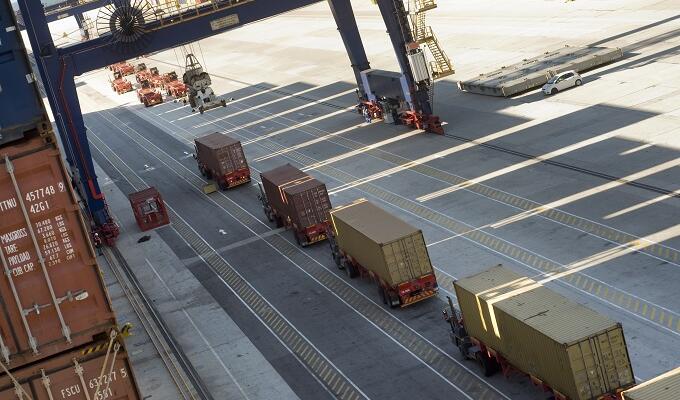



The importance of services for the African Continental Free Trade Area
Businesses that are responsive to regulation, low skill-intensive and can show stable income stand to reap significant trade gains
The services sector currently constitutes a significant percentage of the world economy. Research shows that the top three sectors that received foreign direct investment (FDI) were software and IT services, business services and real estate.1 In sub-Saharan Africa, trade in services account for nearly half of gross domestic product (GDP) and 10% of trade.2 For countries such as Mauritius, the services sector is the largest contributor to GDP, contributing almost three-quarters of its economic output.3
There is also evidence of FDI concentrating mostly in services on the continent as a whole. South African FDI on the continent, for example, has largely focused on services, key among them being banking and financial services.4,5 The facts show that Africa is moving fast towards trade in services and the African Continental Free Trade Area (AfCFTA) is an opportunity to increase intra-African trade in services for continental gains.
These opportunities can be made possible by first taking a keen look at how those gains can be achieved. Addressing non-tariff measures (NTMs) is critical to unlocking the full potential of intra-African services trade. Service enterprises that are highly responsive to regulation, income inelastic and low-skill intensive will experience significant trade gains for three reasons.6
Intra-African transport and business services trade flows before and after AfCFTA implementation – 2020-2065 projected calculations ($ billion)
First, services highly responsive to regulation can benefit from trade by reducing regulation without the need for financial investment. Second, income-inelastic services will benefit from economies of scale as demand is not largely affected by changes in income. Third, many African countries are abundant in low-skill labour, allowing services that are low-skill intensive to scale up their operations more quickly.
Selecting four services out of five (transport, communication, financial services, and business services) for the AfCFTA initial round of negotiations7, research has shown that transport and business services would experience the largest trade gains compared to financial and communication services.
Intra-African communication and financial services trade flows before and after AfCFTA implementation – 2020-2065 projected calculations ($ billion)
The finding is a result of simulated trade projections between 2020 and 2065 using the ad valorem Services Trade Restrictiveness Index (STRI).8 Those STRIs were calculated as estimated tariff equivalents of services NTMs based on a country’s services regulatory framework. Each services sector is lowered to the lowest ad valorem STRI in the world. The STRI is measured as a percentage of the price for each of the services sector.
The analysis found that by 2065 intra-African transport services will experience the largest annual trade gains at $286 billion, followed by business services with $207 billion. These sectors are highly responsive to regulation, income inelastic and low-skill intensive; for business services, this varies by industry. Therefore, reducing regulations will enable the sectors to benefit from economies of scale due to high demand and low-skill labour abundance.
Take transportation services, demand occurs even at low-income levels and requires low-skill labour. If regulations affecting trade in this sector are streamlined, the sector will significantly benefit from high demand and businesses can scale up operations. In this light, small and medium-sized enterprises (SMEs) operating in these services have the possibility of reaching a wider market. Additionally, such NTMs taken under the context of the AfCFTA can spur the creation of new SMEs to sustain the use of these services.
Communication and financial services experience the lowest trade gains based on the analysis at an annual $69 billion and financial services at $7.4 billion respectively by 2065. These projections highlight that even at low levels of NTMs trade in these sectors will still be very low. There are two possible explanations for this from both the demand and supply side.
On the demand side, these services are income elastic; that is, they are most often demanded at higher income levels. Since most African nations are low or lower-middle income countries, demand for these services therefore tends to be low. On the supply side, both services are high-skill intensive, requiring human capital which is relatively scarce. However, both communication and financial services have an opportunity for trade growth thanks to the growth of financial technology (fintech).
Fintech is a growing financial service industry in Africa with the potential to tap into Africa’s 60% un-banked population.9 Regions that have adopted a more open approach to having both non-financial companies and traditional banks offering fintech services have experienced higher fintech adoption and financial transactions.
East Africa is now the leading region in terms of alternative financing in Africa, accounting for 41% of the market share. It is followed by West Africa (24%), Southern Africa (19%), Central Africa (12%) and North Africa (4%). East Africa leads in fintech adoption largely due to flexible regulation, allowing non-financial institutions to provide financial services. Therefore the impact of fintech increasing financial services trade will largely depend on market demand, infrastructure capabilities and regulation.
--------
1 fDi Intelligence (2019). The fDi Report 2019: Global Greenfield Investment Trends. London: Financial Times. Retrieved from https://s3-eu-west-1.amazonaws.com/minisites.specialist.titles/fdiintelligence.com/report/2019/files/The_fDi_Report_2019.pdf
2 Hoekman, B. and Shepherd, B (2017). Services Productivity, Trade Policy and Manufacturing Exports. The World Economy, Vol. 40 (3), pp. 499-516. First Published 22 September 2015
https://onlinelibrary.wiley.com/doi/10.1111/twec.12333
3 Export Enterprises SA (2019, October). Mauritius Trade Easy: Expanding markets and Facilitating compliance. Retrieved from http://www.mauritiustrade.mu/en/trading-with-mauritius/mauritius-economics-outline
4 Labour Research Service (2019). ‘Labour Research Service: Multinational Corporations Database’. Available at: database.lrs.org.za/mnc/
5 Nandonde, F. Adamu, R. Adu-Gyamfi, T.S. Mmusi, H. Wamalwa, S.A. Asongu, J.Pieter Opperman and J.R. Makindara (2019). ‘Linkages And Spillover Effects Of South African Foreign Direct Investment In Botswana And Kenya’. WIDER Working Paper 2019/53. Helsinki: UNU-WIDER.
6 See Gamanya, A. (2019). Services liberalization under the AfCFTA: Potential impacts on intra-African services trade. Master Thesis, Graduate Institute Geneva.
7 The five services enlisted under the AfCFTA trade are; business services, communication services, financial services, tourism and travel, and transport.
8 The ad valorem STRI is based on the work by Fontagné, L., Mitaritonna, C., & Signoret, J. (2016). Estimated Tariff Equivalents of Services NTMs.CEPII Working Paper No 2016-20-August http://www.cepii.fr/PDF_PUB/wp/2016/wp2016-20.pdf
9 Ernst and Young (2019). FinTechs in Sub-Saharan Africa: AN overview of market developments and investment opportunities https://www.ey.com/Publication/vwLUAssets/ey-fin-tech-market-opportunities-2019/$File/ey-fin-tech-market-opportunities-2019.pdf



